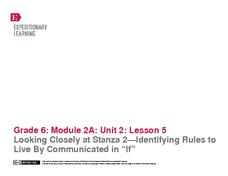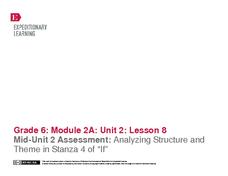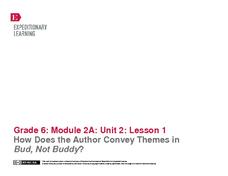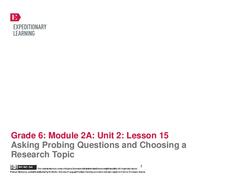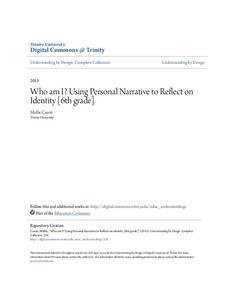Novelinks
The Little Prince: Biopoem Strategy
Learn about character traits with a biopoem activity. Based on Antoine de Saint-Exupéry's The Little Prince, the activity prompts learners to fill in the blanks of a poem form to describe themselves.
EngageNY
Introducing “If” and Noting Notices and Wonders of the First Stanza
After reading chapter 14 of the story Bud, Not Buddy by Christopher Paul Curtis, scholars take part in a read-aloud of the poem If by Rudyard Kipling and compare it to the reading of Bud, Not Buddy. Learners then go deeper into the poem...
EngageNY
Notices and Wonders of the Second Stanza of “If”
Here is an instructional activity that asks pupils to analyze poetry and sparks discussion about two different types of texts: asking how is the poem, If by Rudyard Kipling alike and different from the story, Bud, Not Buddy by...
EngageNY
Looking Closely at Stanza 2—Identifying Rules to Live By Communicated in “If”
Pupils take part in a close reading of the poem, If by Rudyard Kipling, in which they delve deep into its meaning and identify its rules to live by. As the grand discussion progresses, learners then relate the poem's rules with those...
EngageNY
Analyzing Structure and Theme in Stanza 4 of “If”
Here is a lesson that provides scholars with two opportunities to stretch their compare-and-contrast muscles. First, learners compare and contrast their experience reading the fourth stanza of If by Rudyard Kipling to listening to the...
EngageNY
How Does the Author Convey Themes in Bud, Not Buddy?
After reading up to chapter 12 of Bud, Not Buddy by Christopher Paul Curtis, scholars read chapter 13 and take part in a grand conversation about the author's writing techniques. Pupils discuss how his writing conveyed literary themes...
EngageNY
Looking Closely at Stanza 1—Identifying Rules to Live By Communicated in “If”
Here is a lesson plan in which pupils connect themes and rules to live by from the story Bud, Not Buddy by Christopher Paul Curtis to those found in the poem If by Rudyard Kipling. First, scholars discuss their reading and review Bud's...
EngageNY
Asking Probing Questions and Choosing a Research Topic
Begin the writing journey of an evidence-based essay detailing a rule to live by with various activities to familiarize learners with the topic and jump-start brainstorming. First, pupils take part in an in-depth review and discussion of...
EngageNY
Qualities of a Strong Literary Argument Essay
One activity, two essays, and one central theme: qualities of an argument essay. Here, scholars first describe the qualities of an argument essay regarding Bud's rules to live by from the novel Bud, Not Buddy by Christopher Paul Curtis....
Novelinks
The Westing Game: Anticipation Guide
Are all criminals bad people? Pupils answer this and other compelling questions in an anticipation guide for The Westing Game by Ellen Raskin. Designed for learners to complete before reading the text, the...
Read Theory
Analogies 2 (Level 6)
Activate analogy skills with a straightforward exercise. Learners complete 10 analogies, using the bridge sentences provided as support while they determine word relationships.
Curated OER
Night of the Twister
Pupils use reading strategies for Night of the Twister. In this reading strategies instructional activity, students name five major catastrophes and books about each. Pupils complete a vocabulary section, make inferences and predictions,...
Scholastic
Test-Taking Strategies for Three Subject Areas
Sometimes a test page loaded with text can make a student's face go blank. Help them decipher what a text question is asking with a series of tips focused on reading comprehension, vocabulary, and language arts mechanics.
Trinity University
Who Am I? Using Personal Narrative to Reflect on Identity
Who am I? Pupils work to answer this question through a unit that explores personal narratives and identity. Exit tickets for activities that examine different poems, short stories, and autobiographical writing serve as prewriting for...
Nemours KidsHealth
Smoking: Grades 6-8
Light up middle schoolers' understanding of the monetary and health costs of smoking with two activities. First, class members calculate how much a smoker would spend in a year if they smoke a pack a week or a day. They then explore...
Museum of Tolerance
Family Tree Activity
Discover the family histories that make the classroom with a family tree activity. Scholars locate information about their family, construct a family tree, and work together to tally where family members are born.
EngageNY
Introducing Research Folders and Generating a Research Question
Take the next step in the writing process with a lesson plan geared towards the completion of writing an evidence-based essay about a rule to live by, as Bud did in Bud, Not Buddy by Christopher Paul Curtis. Pupils collaborate with their...
Curated OER
Running Out of Time: Picture Book Activity
Ease your class into reading Running Out of Time by first reading The Boy Who Stopped Time, a picture book with some similar concepts and themes. After a reading of the story, learners participate in a discussion and journaling exercise.
Mathematics Vision Project
Module 1: Getting Ready Module
This fabulous resource is a must-have for any algebra teacher's arsenal of lessons. Developing the idea of equations and use of variables from basic physical scenarios, learners gain valuable intuition in the structure and meaning of...
Curated OER
Tangerine: Instructions for Guided Imagery
A guided imagery exercise draws class members into a particularly intense scene in Edward Bloor's Tangerine. After listening to a reading of an excerpt from the text, participants respond to a series of questions and then share their...
Curated OER
Running Out of Time: Vocabulary Strategies
Review concepts and terms after reading Running Out of Time. Learners each come up with a few terms that they think are important and then participate in a list-group-label exercise, paying close attention to the two main years featured...
EngageNY
Pitching Your Claim with Best Evidence
Does Bud use his rules to survive or thrive? That is the driving question of a lesson plan following the reading of Bud, Not Buddy by Christopher Paul Curtis. In an argument essay prewriting activity, pupils use textual evidence to...
EngageNY
End of Unit 2 Assessment: Final Draft of Literary Argument Essay
Take the last step in writing a literary argument essay using Bud, Not Buddy by Christopher Paul Curtis in an activity focused on feedback. Using the stars and steps revision method, pupils consider teacher and peer feedback to revise...
Curated OER
Hatchet: Predicting the Outcome Guide
What will happen in Hatchet by Gary Paulsen? Kids read a series of possible events that will occur in the novel and mark whether they agree or disagree with the probability of each event happening.





